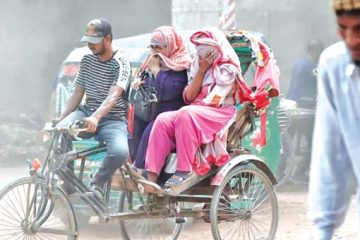COMMENTARY
Why the AL won and the BNP lost the election-2008
Mahmud ur Rahman Choudhury
God forbid that I be considered pro or anti anyone. I have to start on this apologetic tone because things are so polarized in Bangladesh that people tend to see everything in black and white ignoring the shades in between and the other 5 bright colors of the rainbow but for my own sake and for the sake of my readers, I cannot remain blinkered and have to see things in Panasonic colors. This analysis of the crucial 2008 election is meant to throw up certain issues which both the political parties and the public need to be aware of, if our progress towards democracy is to remain unfettered and unhindered.
Why the AL won and what it ought to do with its victory.
The AL’s win alone, minus its alliance, can only be compared with the 1970 elections which also gave a colossal victory to AL on a mandate which led to the independence of Bangladesh in 1971 – that was not a change; it was as complete a paradigm shift as is possible in a real world. In all probability the electorate voted so massively for the AL with intents of bringing about another paradigm shift.
The reasons as to why the AL won so overwhelmingly can be summarized as follows:
(1) The leadership remained united behind Sheikh Hasina inspite of many differences of opinion within it. (2) The united leadership could not only keep the organization intact but could also motivate it to withstand the disruptive effects of 2 years of military backed emergency regime. (3) The AL’s positive, constructive, measured and intelligent engagement with both the Emergency Government and the EC allowed it to influence many key decisions regarding the process of elections which went to its absolute advantage. (4) The skillful propagandistic use of the backlash from the 5 years of BNP-Jamaat miss-governance, corruption and support of militancy weaned most of the women, the uncommitted and new young voters away from BNP. (5) The successful Sector Commanders Forum’s stand against the war criminals severely handicapped the Jamaat, the major alliance partner of the BNP. (6) The skilful use of the urge for change in the populace went in favour of the AL because it could reflect those urges in its election manifesto and could effectively and convincingly propagate it among the electorate.
The AL has now 5 years to fulfill its major promises of: (1) Controlling inflation. (2) Revitalizing agriculture and industry. (3) Ensuring basic right of food, shelter, clothing, education and health (4) providing more opportunities for employment both in urban and rural areas. (5) Drastically reducing poverty. (6) Ensuring food and energy security. (7) Tackling militancy and terrorism. (8) Ensuring good governance through reduction of corruption, through changes in political culture, through transparency and accountability of public administration, through allowing the judiciary to function effectively and independently, through making the parliament affective and through implementation of local government. (9) Ensuring social, economic and political equity and justice. (10) Bringing war criminals to justice.
Why the BNP lost and what it ought to do with its defeat.
The reasons as to why the BNP lost so miserably can be summarized as follows: (1) Its divisive leadership severely disrupted its entire organizational integrity, drastically reducing the party’s ability to withstand the damaging effects of the Emergency regime. (2) The leadership was unable to accurately judge the changes taking place in the Country and adjust the party’s principles, organization and key personnel to reflect those changes. (3) The BNP’s stubborn refusal to engage with the Emergency Government and the EC denied it any opportunity to influence the changes in the electoral process to its advantage. (4) Its refusal to jettison the Jamaat as an alliance partner was perceived by the electorate as supporting militancy and terrorism and protecting war criminals. (5) Its stubbornness in owing up to its miss-governance and corruption during its tenure in government was perceived by the electorate as an inability to bring about desired and needed changes. (6) Its lack-luster election campaign with repeated emphasis on non-existent conspiracies diverted it from its real task of propagating its election manifesto.
What the BNP needs to do with its defeat is to: (1) Take a deep, intelligent and realistic look at its principles, organization and leadership and bring about revolutionary changes in them. (2) Revitalize its demoralized grass-root level organization and mount a careful and well thought-out strategy to recruit new members and supporters. (3) Continuously, vigorously and visibly engage in Parliament and play a responsible opposition role although its role would be severely circumscribed by it negligible parliamentary memberships.
What the AL and BNP ought not to do
(1) Engage in propagandist and polemical recriminations against each other.
(2) Forget their commitments and promises to the Nation.
(3) Engage in corruption and politicization of State institutions.
(4) Engage in confrontational and destructive politics.
(5) Attempt to forcefully redefine “National Identity”.
(6) Attempt to monopolize political, social and economic power.
Concluding Remarks
Defeat and victory are relative terms denoting temporary state of affairs but the war is about establishing democracy. This election has been a victory for the whole Nation, a victory “for the people, by the people and of the people”; a victory for democracy, for the political parties and for everyone, marking an important landmark battle but much of the greater war for establishing democracy remains ahead. The AL and the BNP will now have to get the Nation together to fight and to win that greater war – therein will lay the ultimate decision of defeat and victory and not in this one single election.
Courtesy: thebangladeshtoday.com







